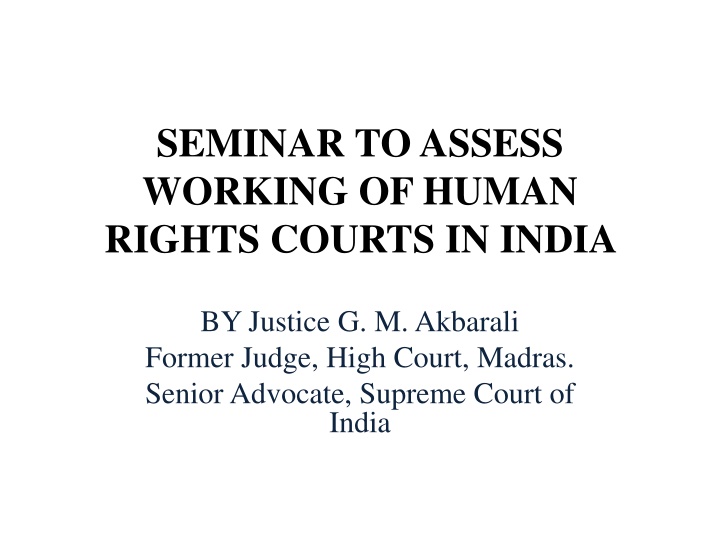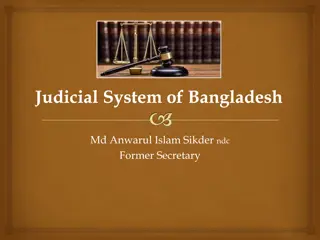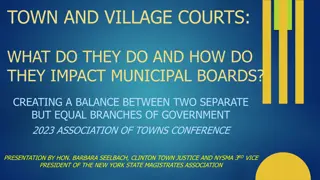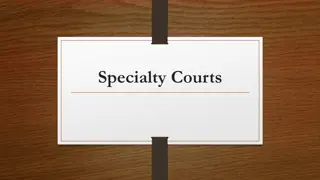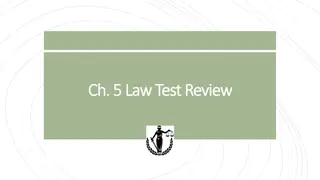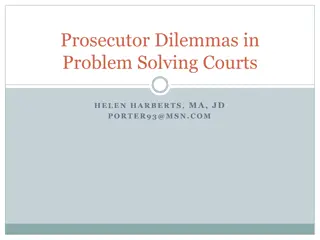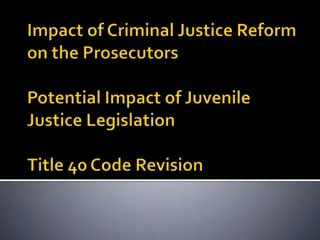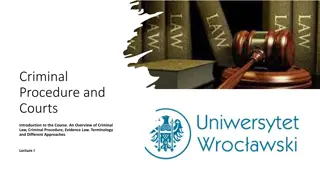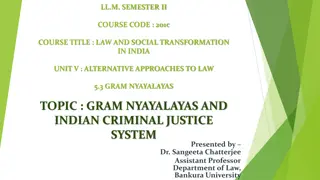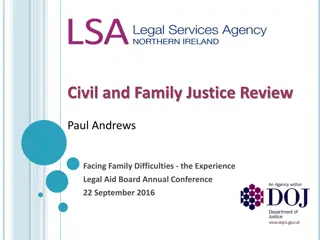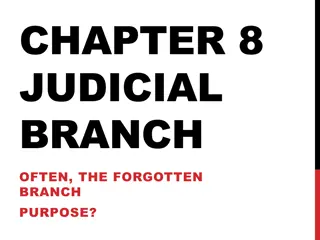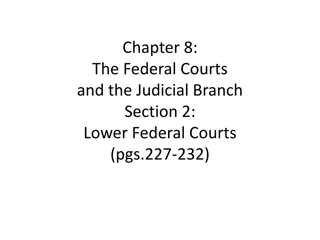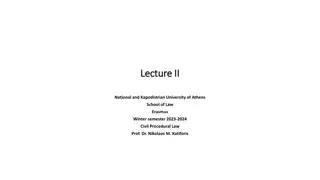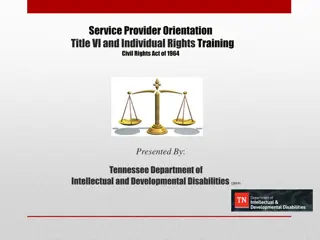Seminar on Assessing the Functioning of Human Rights Courts in India by Justice G. M. Akbarali
Explore the essential aspects of human rights, the definition under the Human Rights Act of 1993, basic rights, and instances of violations, focusing on cases like custodial death, fake encounters, women and children issues, bonded labor, and more in India.
Download Presentation

Please find below an Image/Link to download the presentation.
The content on the website is provided AS IS for your information and personal use only. It may not be sold, licensed, or shared on other websites without obtaining consent from the author.If you encounter any issues during the download, it is possible that the publisher has removed the file from their server.
You are allowed to download the files provided on this website for personal or commercial use, subject to the condition that they are used lawfully. All files are the property of their respective owners.
The content on the website is provided AS IS for your information and personal use only. It may not be sold, licensed, or shared on other websites without obtaining consent from the author.
E N D
Presentation Transcript
SEMINAR TO ASSESS WORKING OF HUMAN RIGHTS COURTS IN INDIA BY Justice G. M. Akbarali Former Judge, High Court, Madras. Senior Advocate, Supreme Court of India
HUMAN RIGHTS Human rights can be defined as ...rights inherent to all human beings, whatever our nationality, place of residence, sex, national or ethnic origin, colour, religion, language, or any other status. We are all equally entitled to our human rights without discrimination. These rights are all interrelated, interdependent and indivisible. All human beings are born free and equal in dignity and rights. They are endowed with reason and conscience and should act towards one another in a spirit of brotherhood. Universal Declaration.
Under Section 2(d) of Human RightsAct, 1993, human rights means the rights relating to life, liberty, equality and dignity of the individual guaranteed by the Constitution or embodied in the International Covenants and enforceable by courts in India.
What are basic rights: Right to live No slavery No torture Freedom to move Freedom of thought Freedom of expression Right to Democracy And every other right envisaged in national and international frontiers.
Offence against human Being To violate the most basic human rights; on the other hand, is to deny individuals their fundamental moral entitlements. It is, in a sense, to treat them as if they are less than human and undeserving of respect and dignity.
Instances of human rights violations Case dealt in India Custodial death Fake encounters Cases related to women and children Police excesses Atrocities on Minority and dalit Bonded labour Armed forces/ Para military
CASES RELATING TO WOMEN AND CHILDREN Female foeticide and infanticide Child marriage in the name of customs, despite of legal prohibition Child labour Sexual assault on children as well as women Rape Immoral trafficking
BONDED LABOUR Debt bondage in India Debt bondage in India was legally abolished in 1976 but it remains prevalent, with weak enforcement of the law by governments. Bonded labour involves interlinking of credit and labor agreements that devolve into slave-like exploitation due to severe power imbalances between the lender and the borrower. the exploitive
Human Rights Courts For the purpose of providing speedy trial of offences arising out of violation of human rights, the State Government may, with the concurrence of the Chief Justice of the High Court, by notification, specify for each district a Court of Session to be a Human Rights Court to try the said offences: Provided that nothing in this section shall apply if (a) a Court of Session is already specified as a special court; or (b) a special court is already constituted, for such offences under any other law for the time being in force.
The object of this section is to ensure speedy justice with regards to offence against inhumane behaviour. The object has a strong motive to ensure justice to all mankind, unfortunately the construction of the section has made it impracticable. Till date very few states have set up a human rights court. There are arrays of judgements pronounced in many states instructing to set up such court. To state a few But those remain as mere pronouncement.
The section states offence arising out of human rights , the draftsmen have failed to mention the ambit of this phrase. The following has to considered What constitute such offense? Who can be convicted under the section? What could be the orders ? Each session court to try the offence... Who shall take cognizance of such offence is not mentioned.
Under section 193 of Crpc, it is clearly mentioned ...unless specifically provided the court of session cannot shall not take cognizance of an offence as Court of original jurisdiction.... The dilemma of committal of an offence stands as a practical difficulty to commence the proceeding.
What is the solution? What type of cases are dealt by Human Rights Court?
Madras High Court K.Dhamodharan vs R.V.Narbabi decided on 10 November, 2006 The respondent/complainant preferred a complaint before the Court of the Chief Judicial Magistrate, Kumbakonam, which was formerly the Human Rights Court, under Section 2 (d) of the Protection of Human Rights Act r/w Section 200 of the Code of Criminal Procedure. Thereafter, the entire records in the case was sent to the Court of the Principal District Judge, Thanjavur which was notified as the Human Rights Court in the District of Thanjavur. The latter chose to send the entire Judicial Magistrate No.I, Thanjavur to adhere to the committal proceedings, as the Human Rights Court was not vested with the power to take up the private complaint directly on file without committal proceedings. case records to the
The sum and substance of the complaint is that the petitioner/accused herein, who was serving as Station House Officer at Thanjavur Town East Police Station, entertained a false complaint given by one Ashokkumar in connection with the introduction of one Sethu Ramachandran by the complainant to the said Ashokkumar and in the guise of such a complaint preferred by Ashokkumar, the complainant was forcibly taken by the accused to the police station on 19.04.2003. The accused and his subordinates tortured the complainant to give a cheque and put his signature in stamp papers. The complainant was not given even food by the accused. The accused tortured and harassed the complainant for eight long hours on 19.04.2003 in order to obtain a cheque and his signature in stamped papers. The accused let off the complainant only in the evening of 19.04.2003 after forcibly obtaining his signature in two stamp papers dated 28.03.2003. The accused violated the fundamental rights of the complainant in keeping him in illegal custody.
As the committal proceedings are in progress, the present petition has been filed by the accused seeking quashment of the whole proceedings in P.R.C.No.38 of 2005 on the file of the learned Judicial Magistrate No.I, Thanajavur. The learned counsel for the petitioner/accused would vehemently submit that any complaint regarding the violation of human rights shall be submitted only before the State Commission constituted under the Protection of Human Rights Act, 1993. No private complaint would lie as against the public servant. The protection given under the Human Rights Act for the public servant will be in peril, if such a private complaint is entertained by the Judicial Magistrate.
The private complaint filed by the complainant has no sanction of law. He would further contend that the entire gamut of facts and circumstances spoken to by the complainant in the private complaint does not reflect violation of any human rights. On that score also the complainant cannot prosecute the Inspector of Police, who was just performed his duty on receipt of complainant. Therefore, the whole proceedings which culminated in P.R.C.No.38 of 2005 on the file of the learned Judicial Magistrate No.I, Thanjavur may be quashed, he would lastly submit. complaint against the
